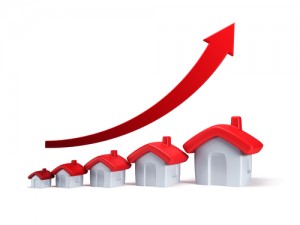
WASHINGTON (AP) — Real estate has gotten hot again.
Home sales are on pace for their best year since 2007. First-time buyers are streaming back into the market. Prices are skyrocketing, aided by a stronger job market and tantalizingly low mortgage rates that are creating pressure for buyers to act fast.
The resurgence is a sign that the U.S. economy – after muddling through a sluggish, six-year recovery – has re-discovered another source of growth. Buyers are more confident about their own prospects. But many also appear ready to close sales quickly because of concerns of being potentially priced out of the market by rising mortgage rates and home values.
“What we’ve seen is that demand is off the charts in 2015 – and that is really boosting sales,” said Nela Richardson, chief economist at the brokerage Redfin. “Last year, buyers were dipping their toes in their water. Now, they’re diving in.”
The National Association of Realtors said Monday that sales of existing homes climbed 5.1 percent last month to a seasonally adjusted annual rate of 5.35 million. May was the third consecutive month of the sales rate exceeding 5 million homes.
Yet listings have failed to match the greater demand, fueling large price gains. Median home prices climbed 7.9 percent over the past 12 months to $228,700, about $1,700 shy of the July 2006 peak.
About 32 percent of the homes sold last month went to first-timers, compared to 27 percent a year ago. The improvement is substantial but still lags behind the historical average of first-time buyers composing 40 percent of the market.
Several factors help to explain the surge.
First, employers have hired 3.1 million additional workers in the past year as the unemployment rate has slid to 5.5 percent from 6.3 percent. This influx of additional paychecks has led more Americans to feel financially secure after weathering the most severe downturn – sparked by a housing bust – since the 1930s.
“That’s the big psychological shift between this year and last year,” Richardson said.
Secondly, mortgage rates are affordably low but beginning to rise as the Federal Reserve prepares to a key interest rate for the first time in nearly a decade.
Average 30-year fixed rates were 4 percent last week, according to the mortgage giant Freddie Mac. That average has increased from a 52-week low of 3.59 percent.
Many buyers appear eager to finalize their purchases before rates and prices increase any further, said Jonathan Smoke, chief economist at Realtor.com.
The result is that more homes are selling at a faster clip. A stunning 28 percent of homes are selling within two weeks, compared to 19 percent before the recession, according to a recent survey by the brokerage Coldwell Banker.
Rising home prices have added an extra sense of urgency among homebuyers like Logan Reynolds, who works in advertising in San Angelo, Texas.
When a three-bedroom, two-bath house hit the market for $110,000 several weeks ago, Reynolds was first out of the gate to make an offer, ultimately closing the deal for $112,000, just $3,000 under his spending limit.
“We wanted to buy before it got too expensive where we could get what we wanted for the price we could afford,” said Reynolds, 23.
Lastly, the rising prices mean that more homeowners are starting to regain the equity lost in their homes during the downturn. The number of mortgage holders owing more on their loans than their homes are worth has tumbled 19 percent in the past year to 5.1 million – or 10.2 percent of all mortgaged properties, according to real estate analytics firm CoreLogic.
Overall supplies still remain tight. But because more mortgage holders are recovering equity, more of them can afford to sell their home and use the proceeds to buy a new home, creating greater demand.
“The housing market is unique in that the sellers are also the majority of the buyers,” said Mark Fleming, chief economist at First American, a title insurance and real estate services firm.
Many economists caution that the sales gains of recent months could be short-lived if prices increase so sharply buyers are priced out of the market. The recent rise in mortgage rates could also curtail sales, similar to the higher mortgage rates slashing into sales in the middle of 2013.
The latest gains also appear to be driven by people searching for value, unlike the previous debt-fueled increase in housing prices that ultimately led the economy to crash.
Buyers such as Amanda Fyler saw more financial benefits in owning after renting a 400 square-foot studio in Washington, D.C. The 32 year-old nonprofit analyst is in the middle of finalizing the purchase of a two-bedroom condominium. She figures that by renting the extra bedroom, her housing costs will largely stay the same as her current rent. Plus, she will be able to build equity and deduct the interest from her taxes.
“Otherwise,” she said, “it’s not affordable in this city.”